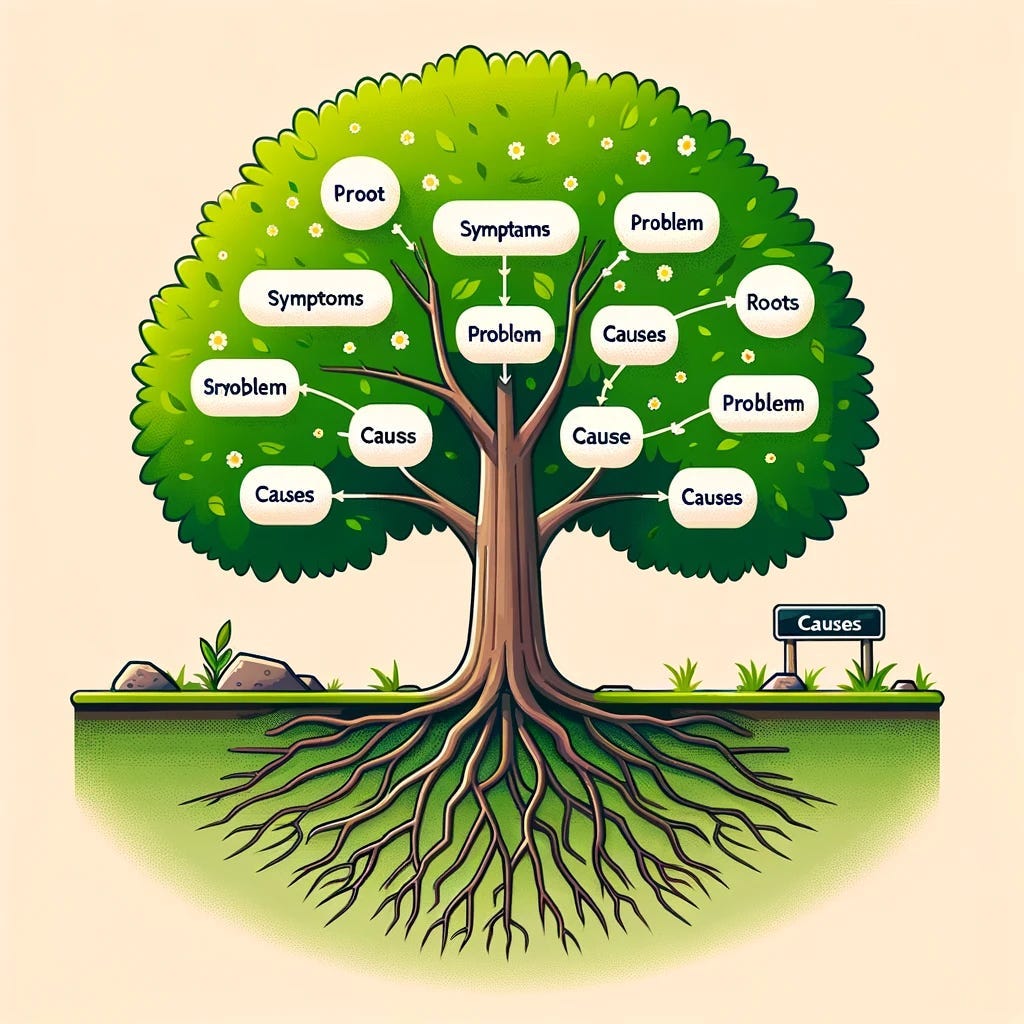An irresistible metaphor: There is a garden, and it is full of weeds. You cut the weeds one by one, and after a day of effort, the garden is clean and beautiful. But then over the next few weeks the weeds grow back. You need to cut them again — but you realize that if you want to get rid of the problem for good, you need not to cut the stems, but to dig into the dirt and remove the roots. Otherwise the weeds will grow back over and over and over again.
In common parlance, a root cause is the “true” cause of a problem: the end of a series of “Why?” questions that move up the leaves and the stem of the issue until you have found the one thing you need to fix to solve the problem for good. It is a popular expression in the parlance of engineering, which has a whole method called “root cause analysis” about which there exist a thousand blog posts with cute tree diagrams, sometimes clumsily made by generative AI.

Looking for root causes is attractive. It’s the smart thing to do: understand a problem so thoroughly you can solve it forever through one clever trick. By contrast, finding imperfect, temporary solutions — often called “patches” — is rather unsatisfying. So it always sounds wise to say, “doing X wouldn’t really solve the problem; we need to find the true cause and solve it for good.”
But I worry that sometimes looking for root causes is too clever. The more complex a system, the less likely you are to actually find the root causes; and when you do find them, they turn out to be intermingled with the roots of a lot of other trees, such that you can’t unearth them without doing a lot of unintended damage.
You see this a lot with environmental issues. I once read an article about conflict in the Democratic Republic of the Congo, a key producer of important minerals like coltan and cobalt, but also a place that is stricken with war, death, exploitation and quasi-slavery. The article said something along the lines of, “if we didn’t need these minerals for the energy transition, then there wouldn’t be all these horrible things happening in the Congo.”1
Which, sure, is true in some sense — if we didn’t need the Congolese mineral resources, there wouldn’t be conflict around those resources. So you could say that the need for cobalt and coltan in advanced economies is the “root cause” of civil war and exploitation in the Congo. But it would be dumb to suggest that the solution to that conflict is to renounce minerals or “the energy transition” or whatever. Instead we should just try to solve the conflict and quasi-slavery directly, maybe through some sort of government intervention.

Similarly, electric cars. I once made the point to a very environmentally minded person that electric cars solve (or at least help with) the problem of traffic noise, a minor benefit of this technology compared with the fact that they don’t use fossil fuels, and was immediately met with a reply along the lines of, “But electric cars won’t solve all the problems caused by our dependency to cars!” I know! I was just making a point about noise, not trying to solve everything at once. It’s fine, actually, to solve just one environmental problem at a time.
In fact not only is it fine, it’s actually the only way to do it. I think the person’s solution to “dependency to cars” was something vague like “changing our relationship with money.” It might as well been “going beyond capitalism” or “degrowth.” Sure, in a sense, capitalism or money or economic growth are the “root cause” of certain problems like polluting the air with car exhaust. In fact, go further — humans can be seen as the root cause of basically every environmental issue. If we weren’t there, the problems also wouldn’t be! But if some world leader got rid of money, or capitalism, or growth, or 95% of the human population, that person would have destroyed so much moral goodness that they’d be, by far, the most evil person to have ever walked the Earth. Much better to “patch” car dependency through local, individual solutions instead.
I think root cause analysis has become popular because a lot of the modern world has been engineered. When dealing with a man-made, designed system, any problems also tend to be man-made, and therefore it is reasonable to expect them to be man-solvable. In computer programming, you can generally find and understand the root cause of even the trickiest bugs, and doing so is better than applying imperfect patches.
The natural environment, the economy, and human societies in general aren’t designed; they’re evolved. The root causes of most things overlap with those of everything else. If you go too deep, any solution to a problem will have second- or third-order effects that are very difficult to predict.
It doesn’t mean you can’t ever do it. I have faith in human capacity to solve even complex evolved problems. But it does mean we should generally be more suspicious of the positive connotation of “looking for the root causes.” Often it’s fine to just patch things. It’s even fine if your patch causes new problems that you (or others) will patch later. The physicist David Deutsch wrote in The Beginning of Infinity that we should expect the future to be a constant cycle of problem → solution → new problems → new solutions, ad infinitum. I think this is the right frame, but it does require abandoning the view that we will someday find the one perfect solution to everything.
That’s somehow unsatisfying, I know. It means accepting that the world is complicated and not fully comprehensible. But sometimes I feel like refusing to do so is (…ironically) the root cause of a lot of our problems.
I’m making a bit of a strawman, because upon rereading the article, it sounded more reasonable than I remembered. But I think my point still stands.







The search for an Ultimate Root Cause takes the place of Original Sin in many people's worldviews, I think: a failing so massive and so connatural to us that endlessly talking about it and its apocalyptic implications takes precedence over actually doing anything to make things work around it.
In other words, RCA's are great for 'analysis' but useless if the need is for 'synthesis' which is what most complex problems need. Is that so?